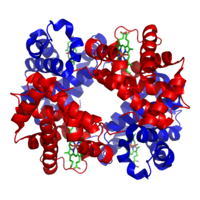
Photo from wikipedia
It has long been documented that cancer cells show increased and persistent oxidative stress due to increased reactive oxygen species (ROS), which is necessary for their increased proliferative rate. Due… Click to show full abstract
It has long been documented that cancer cells show increased and persistent oxidative stress due to increased reactive oxygen species (ROS), which is necessary for their increased proliferative rate. Due to the high levels of ROS, cancer cells also stimulate the antioxidant system, which includes the enzymes superoxide dismutase (SOD), catalase (CAT), and glutathione peroxidase (GPX), to eliminate ROS. However, overexpressed antioxidant enzymes often lead to drug resistance and therapeutic failure. Glioblastoma (GBM) is the most aggressive brain tumor and has the poorest prognosis. The transcription factor CCAAT/enhancer-binding protein delta (CEBPD) is highly expressed in GBM and correlates with drug resistance, prompting us to elucidate its role in GBM cell survival. In this study, we first demonstrated that loss of CEBPD significantly inhibited GBM cell viability and increased cell apoptosis. Furthermore, the expression of CAT was attenuated through promoter regulation following CEBPD knockdown, accelerating intracellular hydrogen peroxide (H2O2) accumulation. In addition, mitochondrial function was impaired in CEBPD knockdown cells. Together, we revealed the mechanism by which CEBPD-mediated CAT expression regulates H2O2 clearance for GBM cell survival.
Journal Title: Oxidative Medicine and Cellular Longevity
Year Published: 2022
Link to full text (if available)
Share on Social Media: Sign Up to like & get
recommendations!